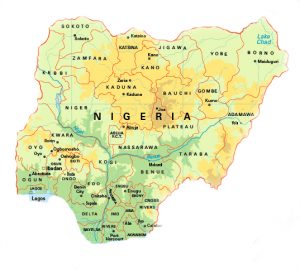Crossroads 2018: Nigeria and Bible Translation
By: Travis Heide

Image from Wikimedia Commons.
Since returning from a two-week discernment trip to Nigeria this past June, I’ve been asked a load of questions regarding that country. What animals live there? What are the road conditions? What did we eat—and what were we able to eat? (Anything and most of everything.) How was the weather? (Surprisingly mild though we went during the rainy season.)
One question the Crossroads West Africa trip with Lutheran Bible Translators (LBT) prepared me to answer is this: Why is Bible translation important? It is a relevant question, considering that the official language of Nigeria is English. And there already exist numerous Bible translations in the world’s most commonly spoken languages, including Mandarin, Spanish, Russian, Portuguese, French, and even Arabic. Why, then, are people still putting in decades’ worth of work and networking to create fresh translations of the most read book on earth?
I left the United States for Nigeria along with three other travelling companions, including Rev. David Federwitz (LBT West Africa Regional Director) and Emily Wilson (LBT Mission Mobilization Coordinator), who had recruited me for the trip. On the ground we met with long-time Bible translator Rev. Chuch Tessaro and Rev. Linus Otronyi (LBT International Associate and a pastor of the Lutheran Church of Nigeria – LCN). We entered the country under the protection of the LCN’s Archbishop Christian Ekong, head of the LCN. I was reminded from time to time that we are not on a “mission” trip. Which was true: we were there to learn.
During the first week of Crossroads, our group stayed in the town of Ikoum in the southern part of Nigeria. Each morning we rode in a van to the place where LBT and Luke Initiative for Scripture Translation (LIST) were working in collaboration with representatives from several ethnic communities to translate the Book of Luke into their mother tongues. Six different language clusters were present at this workshop revising translations of Luke with the help of interdenominational theologians and Paratext computer software. It came as little surprise to know that LIST was working with six different language groups within the vicinity of Ikoum; after all, as I soon learned, Nigeria is home to 502 languages. Rev. Otronyi shared that a little more than 200 of these have some portion of translated Scripture.
On our last day with the LIST project, representatives from the six languages communities were asked the question: Why is Bible translation important? Answers sounded from every corner of the room. In their own words:
- “The Bible is a complete document that everyone on earth needs to understand. Everything that is happening on earth is recorded in the Bible.”
- “It keeps our language from going extinct.”
- “It will give our language international recognition.”
- “To reach the ‘wider room.’”
- “The Bible belongs to those who have the privilege of education.”
- “The God of the Bible is the only one deserving our recognition.”
- “Interpreters are not good enough; it ends up in a Pidgin English.”
- “God understands all languages.”
Bible translation is not simply about getting the written Word to people. There is something precious to the mission of groups like LBT to reach everyone in “the language of their hearts.”
Translation lends dignity to the world’s languages that are not recognized as “official” or as a language of commerce within their society. Of the 502 language groups in Nigeria (not accounting for dialectical differences), only three or four local languages are widely spoken. Translation also ensures the survival of languages that until recently have existed only in oral form; and, as one chief put it, “there is no word in our language that is not in the Bible.” As the Scriptures appear in their native languages, young people are taught to understand grammar—something their grandparents did not have—and how to read without stumbling. To many of those gathered at the translation workshop, the Bible currently belongs to an educated elite with proficiency in English. They commit themselves to bringing it to people of every age and status.
Rev. Otronyi shared an experience he had reading the Bible in his native Yala language. The meaning of the petition in the Lord’s Prayer, “forgive us our trespasses as we forgive those who trespass among us” and Christ’s command to “pray for your enemies” had come in muffled tones when read in English during worship, even when interpreted or paraphrased into Yala. But when these written words of Christ appeared in Yala, they moved hearts.
This is what moves servants of Christ to work with people from different corners of the globe, to the meticulous work of acquiring language and earning the trust of individuals from other cultures, and most of all to listening to the Holy Spirit working through the Word to the heart and to the lips. This is the “why” of the “what” LBT has helped me to see.
Travis Heide is a student at Concordia Lutheran Seminary (Edmonton), currently serving his vicarage at Redeemer Lutheran Church in Kitimat and Terrace, B.C.




